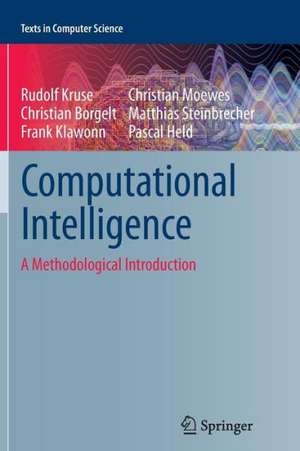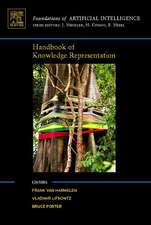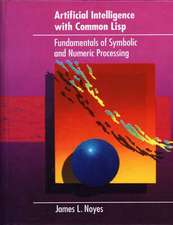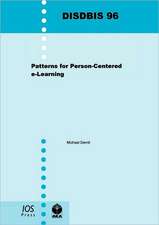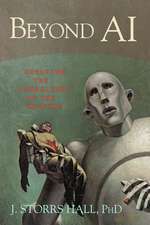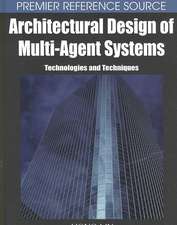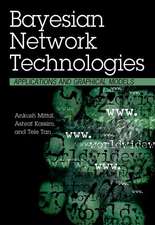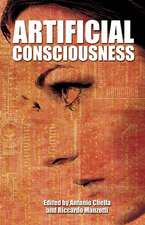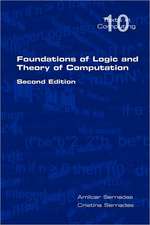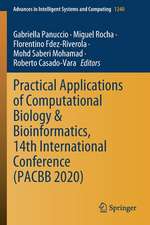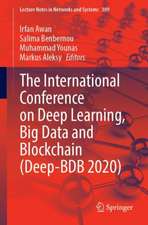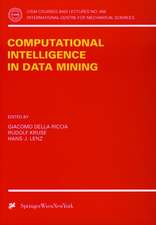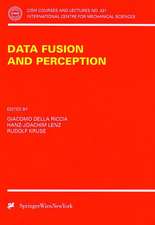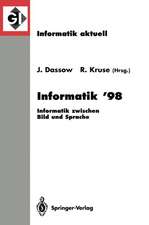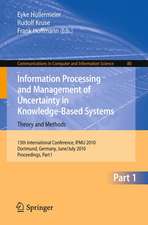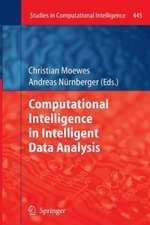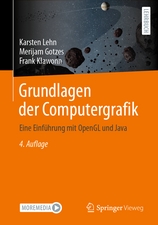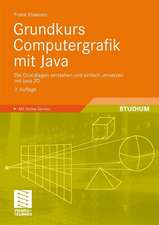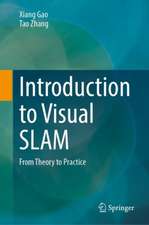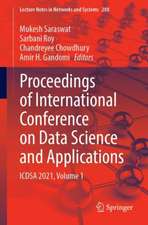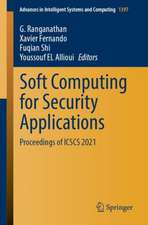Computational Intelligence: A Methodological Introduction: Texts in Computer Science
Autor Rudolf Kruse, Christian Borgelt, Frank Klawonn, Christian Moewes, Matthias Steinbrecher, Pascal Helden Limba Engleză Paperback – 8 feb 2015
Din seria Texts in Computer Science
- 20%
 Preț: 406.21 lei
Preț: 406.21 lei - 20%
 Preț: 370.59 lei
Preț: 370.59 lei - 20%
 Preț: 411.53 lei
Preț: 411.53 lei - 20%
 Preț: 417.80 lei
Preț: 417.80 lei - 20%
 Preț: 306.37 lei
Preț: 306.37 lei - 20%
 Preț: 411.75 lei
Preț: 411.75 lei - 20%
 Preț: 1244.39 lei
Preț: 1244.39 lei - 20%
 Preț: 503.88 lei
Preț: 503.88 lei - 20%
 Preț: 444.93 lei
Preț: 444.93 lei - 20%
 Preț: 474.58 lei
Preț: 474.58 lei - 20%
 Preț: 305.31 lei
Preț: 305.31 lei - 20%
 Preț: 675.36 lei
Preț: 675.36 lei - 20%
 Preț: 423.53 lei
Preț: 423.53 lei - 20%
 Preț: 441.71 lei
Preț: 441.71 lei -
 Preț: 506.24 lei
Preț: 506.24 lei - 20%
 Preț: 366.94 lei
Preț: 366.94 lei - 20%
 Preț: 370.23 lei
Preț: 370.23 lei - 20%
 Preț: 515.36 lei
Preț: 515.36 lei - 15%
 Preț: 637.58 lei
Preț: 637.58 lei - 20%
 Preț: 353.34 lei
Preț: 353.34 lei - 20%
 Preț: 356.82 lei
Preț: 356.82 lei - 20%
 Preț: 181.92 lei
Preț: 181.92 lei - 20%
 Preț: 330.42 lei
Preț: 330.42 lei - 20%
 Preț: 743.62 lei
Preț: 743.62 lei - 20%
 Preț: 663.45 lei
Preț: 663.45 lei -
 Preț: 457.75 lei
Preț: 457.75 lei - 20%
 Preț: 536.66 lei
Preț: 536.66 lei -
 Preț: 385.84 lei
Preț: 385.84 lei - 20%
 Preț: 358.24 lei
Preț: 358.24 lei - 20%
 Preț: 394.57 lei
Preț: 394.57 lei - 20%
 Preț: 344.76 lei
Preț: 344.76 lei - 20%
 Preț: 621.18 lei
Preț: 621.18 lei - 20%
 Preț: 350.86 lei
Preț: 350.86 lei - 20%
 Preț: 348.89 lei
Preț: 348.89 lei - 20%
 Preț: 339.95 lei
Preț: 339.95 lei - 20%
 Preț: 588.21 lei
Preț: 588.21 lei - 20%
 Preț: 199.57 lei
Preț: 199.57 lei - 20%
 Preț: 341.30 lei
Preț: 341.30 lei - 23%
 Preț: 726.94 lei
Preț: 726.94 lei - 20%
 Preț: 325.30 lei
Preț: 325.30 lei - 20%
 Preț: 595.80 lei
Preț: 595.80 lei - 20%
 Preț: 593.48 lei
Preț: 593.48 lei -
 Preț: 454.31 lei
Preț: 454.31 lei
Preț: 484.72 lei
Preț vechi: 605.90 lei
-20% Nou
Puncte Express: 727
Preț estimativ în valută:
92.76€ • 100.73$ • 77.92£
92.76€ • 100.73$ • 77.92£
Carte tipărită la comandă
Livrare economică 22 aprilie-06 mai
Preluare comenzi: 021 569.72.76
Specificații
ISBN-13: 9781447158493
ISBN-10: 1447158490
Pagini: 504
Ilustrații: XII, 492 p.
Dimensiuni: 155 x 235 x 30 mm
Greutate: 0.7 kg
Ediția:2013
Editura: SPRINGER LONDON
Colecția Springer
Seria Texts in Computer Science
Locul publicării:London, United Kingdom
ISBN-10: 1447158490
Pagini: 504
Ilustrații: XII, 492 p.
Dimensiuni: 155 x 235 x 30 mm
Greutate: 0.7 kg
Ediția:2013
Editura: SPRINGER LONDON
Colecția Springer
Seria Texts in Computer Science
Locul publicării:London, United Kingdom
Public țintă
GraduateCuprins
Introduction.- Part I: Neural Networks.- Introduction.- Threshold Logic Units.- General Neural Networks.- Multi-Layer Perceptrons.- Radial Basis Function Networks.- Self-Organizing Maps.- Hopfield Networks.- Recurrent Networks.- Mathematical Remarks.- Part II: Evolutionary Algorithms.- Introduction to Evolutionary Algorithms.- Elements of Evolutionary Algorithms.- Fundamental Evolutionary Algorithms.- Special Applications and Techniques.- Part III: Fuzzy Systems.- Fuzzy Sets and Fuzzy Logic.- The Extension Principle.- Fuzzy Relations.- Similarity Relations.- Fuzzy Control.- Fuzzy Clustering.- Part IV: Bayes Networks.- Introduction to Bayes Networks.- Elements of Probability and Graph Theory.- Decompositions.- Evidence Propagation.- Learning Graphical Models.
Recenzii
From the reviews:
“This book teaches computational intelligence (CI) in a thorough, methodological manner that is theoretically profound and educationally oriented. … this book is well designed for the independent student who wishes to learn the fundamentals of CI without the need for an instructor. The organization and thorough step-by-step methodology makes it an excellent startup guide for someone who wants to learn CI … . This book is targeted at beginners, students, or professionals who wish to understand CI.” (Mario Antoine Aoun, Computing Reviews, February, 2014)
“The book under review is a textbook that features sub-symbolic approaches developed within the field of Artificial Intelligence … . It can be used as a companion book for lectures, with exercises and slides to be found on the book’s website. With its focus on sub-symbolic approaches, it presents a comprehensive and detailled source of information complementary to other commonly used textbooks in Artificial Intelligence that mostly focus on symbolic approaches.” (Jana Köhler, zbMATH, Vol. 1283, 2014)
“The book is a comprehensive treatise on computational intelligence with a focus on the underlying methodology and algorithms. … The reader can enjoy a comprehensive and systematically arranged exposure of the material. … The references following each chapter can serve as a list of introductory readings on the individual areas of computational intelligence. … the reader gains a good sense of computational intelligence as an important endeavor supporting analysis and synthesis of intelligent systems. … a useful compendium of knowledge for a broad audience.” (Witold Pedrycz, Mathematical Reviews, November, 2013)
“This book teaches computational intelligence (CI) in a thorough, methodological manner that is theoretically profound and educationally oriented. … this book is well designed for the independent student who wishes to learn the fundamentals of CI without the need for an instructor. The organization and thorough step-by-step methodology makes it an excellent startup guide for someone who wants to learn CI … . This book is targeted at beginners, students, or professionals who wish to understand CI.” (Mario Antoine Aoun, Computing Reviews, February, 2014)
“The book under review is a textbook that features sub-symbolic approaches developed within the field of Artificial Intelligence … . It can be used as a companion book for lectures, with exercises and slides to be found on the book’s website. With its focus on sub-symbolic approaches, it presents a comprehensive and detailled source of information complementary to other commonly used textbooks in Artificial Intelligence that mostly focus on symbolic approaches.” (Jana Köhler, zbMATH, Vol. 1283, 2014)
“The book is a comprehensive treatise on computational intelligence with a focus on the underlying methodology and algorithms. … The reader can enjoy a comprehensive and systematically arranged exposure of the material. … The references following each chapter can serve as a list of introductory readings on the individual areas of computational intelligence. … the reader gains a good sense of computational intelligence as an important endeavor supporting analysis and synthesis of intelligent systems. … a useful compendium of knowledge for a broad audience.” (Witold Pedrycz, Mathematical Reviews, November, 2013)
Notă biografică
Rudolf Kruse is a full professor at the Department of Computer Science of the Otto-von-Guericke University of Magdeburg, Germany, where he leads the working group on computational intelligence. Christian Moewes and Pascal Held are research assistants at the same institution. Christian Borgelt is a principal researcher at the European Centre for Soft Computing, Mieres, Spain. Frank Klawonn is a Professor at the Department of Computer Science of Ostfalia University of Applied Sciences, Wolfenbüttel, Germany. Matthias Steinbrecher is a member of the SAP Innovation Center, Potsdam, Germany.
Textul de pe ultima copertă
Computational intelligence (CI) encompasses a range of nature-inspired methods that exhibit intelligent behavior in complex environments.
This clearly-structured, classroom-tested textbook/reference presents a methodical introduction to the field of CI. Providing an authoritative insight into all that is necessary for the successful application of CI methods, the book describes fundamental concepts and their practical implementations, and explains the theoretical background underpinning proposed solutions to common problems. Only a basic knowledge of mathematics is required.
Topics and features:
This clearly-structured, classroom-tested textbook/reference presents a methodical introduction to the field of CI. Providing an authoritative insight into all that is necessary for the successful application of CI methods, the book describes fundamental concepts and their practical implementations, and explains the theoretical background underpinning proposed solutions to common problems. Only a basic knowledge of mathematics is required.
Topics and features:
- Provides electronic supplementary material at an associated website, including module descriptions, lecture slides, exercises with solutions, and software tools
- Contains numerous examples and definitions throughout the text
- Presents self-contained discussions on artificial neural networks, evolutionary algorithms, fuzzy systems and Bayesian networks
- Covers the latest approaches, including ant colony optimization and probabilistic graphical models
- Written by a team of highly-regarded experts in CI, with extensive experience in both academia and industry
Caracteristici
Written by a team of highly-regarded experts, with extensive experience in both academia and industry Offers a profound theoretical introduction to computational intelligence for both students and practitioners Provides electronic supplementary material at an associated website, including module descriptions, lecture slides, exercises with solutions, and software tools Includes supplementary material: sn.pub/extras
